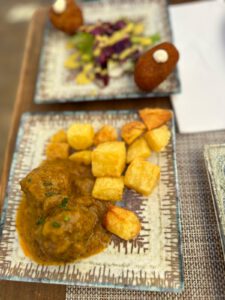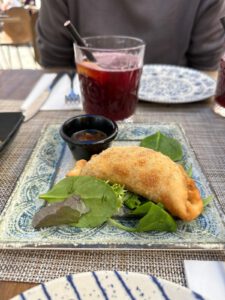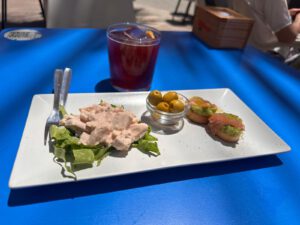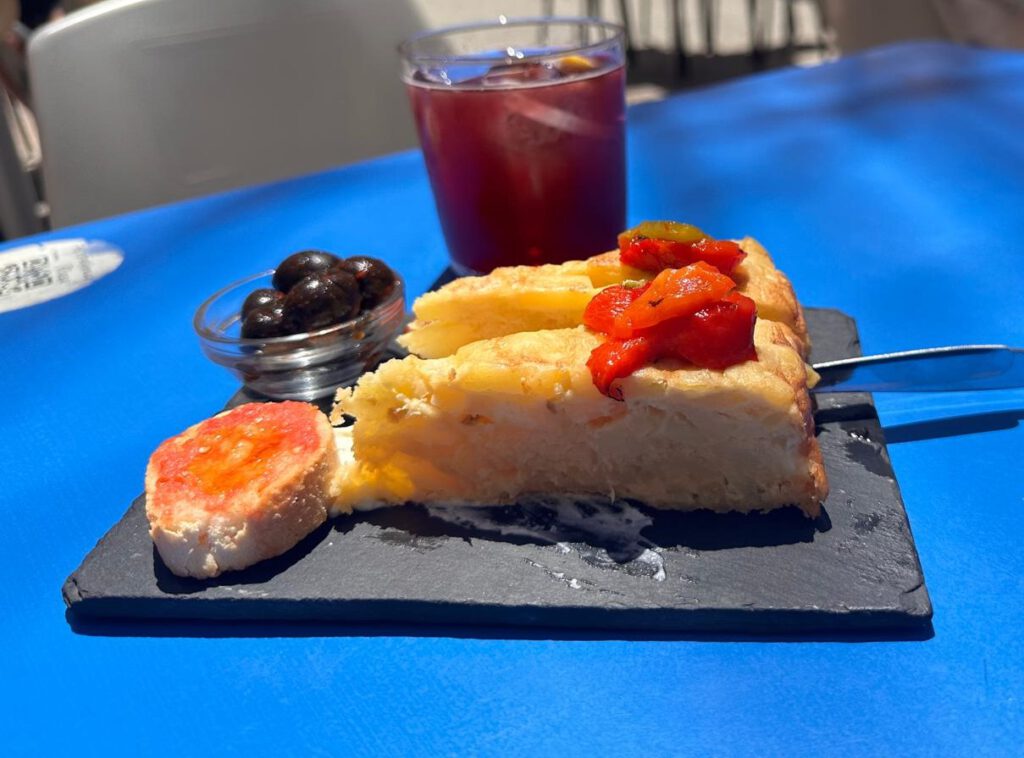Far away from the mass tourism of the Costa del Sol, Almuñécar offers an unique opportunity to experience the real Andalusia . Want to know how to experience life like the locals? In this blog you’ll be taken through daily life in Almuñécar with its Andalusian customs and traditions.
1. Morning Rituals: A Slow Start to the Day
The day usually begins at a relaxed pace. Many locals start their morning with a visit to a churrería, where they enjoy a simple breakfast of pan con tomate (bread with tomato) and a café con leche. One of the favorite spots for this is Churrería San Cristóbal, a classic among the locals.
If you want to enjoy an authentic breakfast, look for terraces filled with Spanish workers. Many of these places are not listed on Google. One of our favorite spots is near Restaurant Don Olivo—it is not easy to pinpoint, but you will recognize it around 10 a.m. by the lively atmosphere on the terrace. Our experience is that construction workers usually start their day at 8 a.m., and by 9:30-10:00 a.m., work comes to a halt as they take a break for coffee at these small, hidden cafés.
2. The Market: The Beating Heart of the Town
On Fridays, the Mercadillo de Viernes takes place on Paseo Blas Infante from 9:00 to 14:00. Here, you will find many stalls selling a variety of goods. This varies from clothing and household items to artisanal Spanish products, organic honey, ceramics, jewelry, and spices.
On Sundays, the rastro, or flea market takes place at the same location and same time. Here you can hunt for second-hand treasures and antiques. These markets offer an authentic glimpse into local life and are great places to experience the culture and traditions of Almuñécar.
At the moment, the town is eagerly awaiting the reopening of the Mercado Municipal de Almuñécar, scheduled for fall 2025. The old market hall is deeply missed by the locals. Visiting the municipal market will be a must if you want to experience the true spirit of Almuñécar. Here, locals buy their fresh vegetables, fruits, fish, and meat. What makes Almuñécar unique is its tropical influence—you will find mangoes, avocados, and papayas grown in the surrounding area. Chatting with the market vendors is all part of the experience, as Andalusian hospitality is all around.
3. Siesta: A Sacred Tradition
Many tourists are surprised to discover that most shops and businesses close between 14:00 and 17:00. This is siesta time: an old tradition when people take a break during the hottest hours of the day. Some locals use this time to eat lunch with their families, while others take a nap or simply relax on a terrace.
If opting for lunch, try the Menú del Día: a traditional and budget-friendly meal offered in many Spanish restaurants. This menu was originally introduced by the Spanish government in the 1960s to provide workers with an affordable and nutritious meal. It remains a popular choice among locals today.
A Menú del Día usually consists of:
• First course (primer plato): Often a light dish like a salad, soup, gazpacho, or pasta.
• Main course (segundo plato): A more substantial dish, typically featuring meat, fish, or a vegetarian option.
• Bread (pan): Almost always included.
• A drink (bebida): Options often include water, wine, beer, or a soft drink.
• Dessert or coffee (postre o café): Choices range from flan, fruit, yogurt, or an espresso (café solo).
If you’re in Almuñécar during siesta time, look for small local restaurants or “mesones” that offer a Menú del Día—it is one of the best ways to eat like a local and experience true Andalusian hospitality! 🍽️😊



4. Evening Life: Tapas and the Paseo
In the evening, Almuñécar truly comes to life. Tapas are not just a tourist attraction here—they are a way of life. In many bars, you will receive a free tapa with your drink, for example at Mesón El Corzo, Los Geranios, or Gastrobar La Trastienda
In Almuñécar (and many parts of Spain), you can enjoy both tapas and dining à la carte. Here’s the difference:
Tapas
- Small dishes meant for sharing.
- Often free with a drink in Andalusia, especially in Granada and nearby areas (Almuñécar included).
- Can also be ordered from a tapas menu for a small price.
- More casual and social—perfect for an evening of drinks and trying different flavors.
Dining à la carte
- You order full meals (starter, main course, dessert).
- Usually in a restaurant setting, where you sit down for a complete dining experience.
- Portions are larger than tapas.
- Can be a set menu (menú del día) for a good price or individual dishes from the menu.
Spanish people enjoy tapas in the early evening (especially with drinks), and if they want a full meal, they go late in the evening ( appr. 21.30-22.00) to a restaurant and order from the menu. What you choose depends on how hungry you are and how you want to spend your evening! 😊
Many locals take a paseo after tapas, a relaxing evening stroll along the boulevard or through the old town. This is the perfect time to meet friends and catch up.
5. Festivals and Traditions: Living by the Rhythm of the Fiestas
The people of Almuñécar love to celebrate. The many festivals throughout the year are a proof of this. One of the most spectacular events is Virgen de la Antigua, where a statue of the town’s patron saint is carried in a sea procession, followed by fireworks. Semana Santa (Holy Week) and the Feria de Almuñécar are also incredible moments when the town is filled with energy and tradition.
Virgen de la Antigua: yearly August 15th
Semana Santa: yearly the week before Easter
Feria de Almunecar: yearly from 9th-15th of August
If you have the opportunity to book around those dates at Villa Bugambilla, you should definitely do it—it’s well worth experiencing these festivities.
The Slow Rhythm of the South
Living like a local in Almuñécar means embracing the moment, making time for family and friends, and not rushing through life. The combination of sunshine, sea, nature, and culture makes it a wonderful place to live or stay for an extended period.
Are you thinking of discovering Almuñécar for a longer stay? Let yourself be inspired by the locals and immerse yourself in the Andalusian lifestyle. You will soon find that the tranquilo rhythm of the south is impossible to resist!
